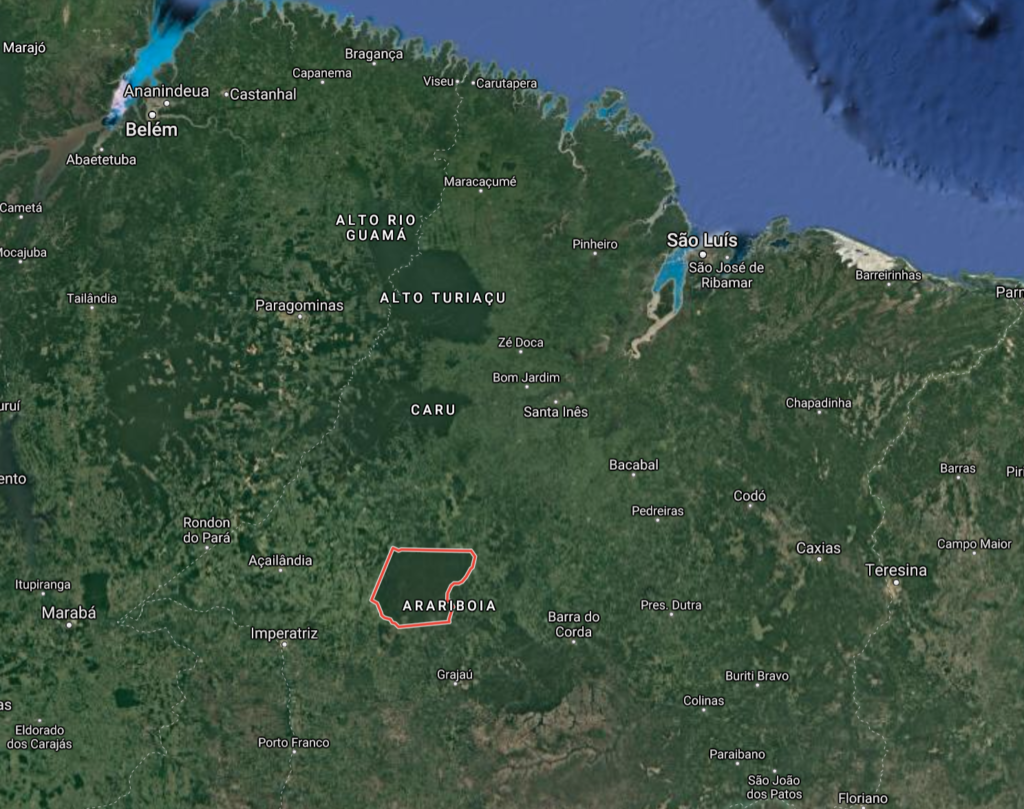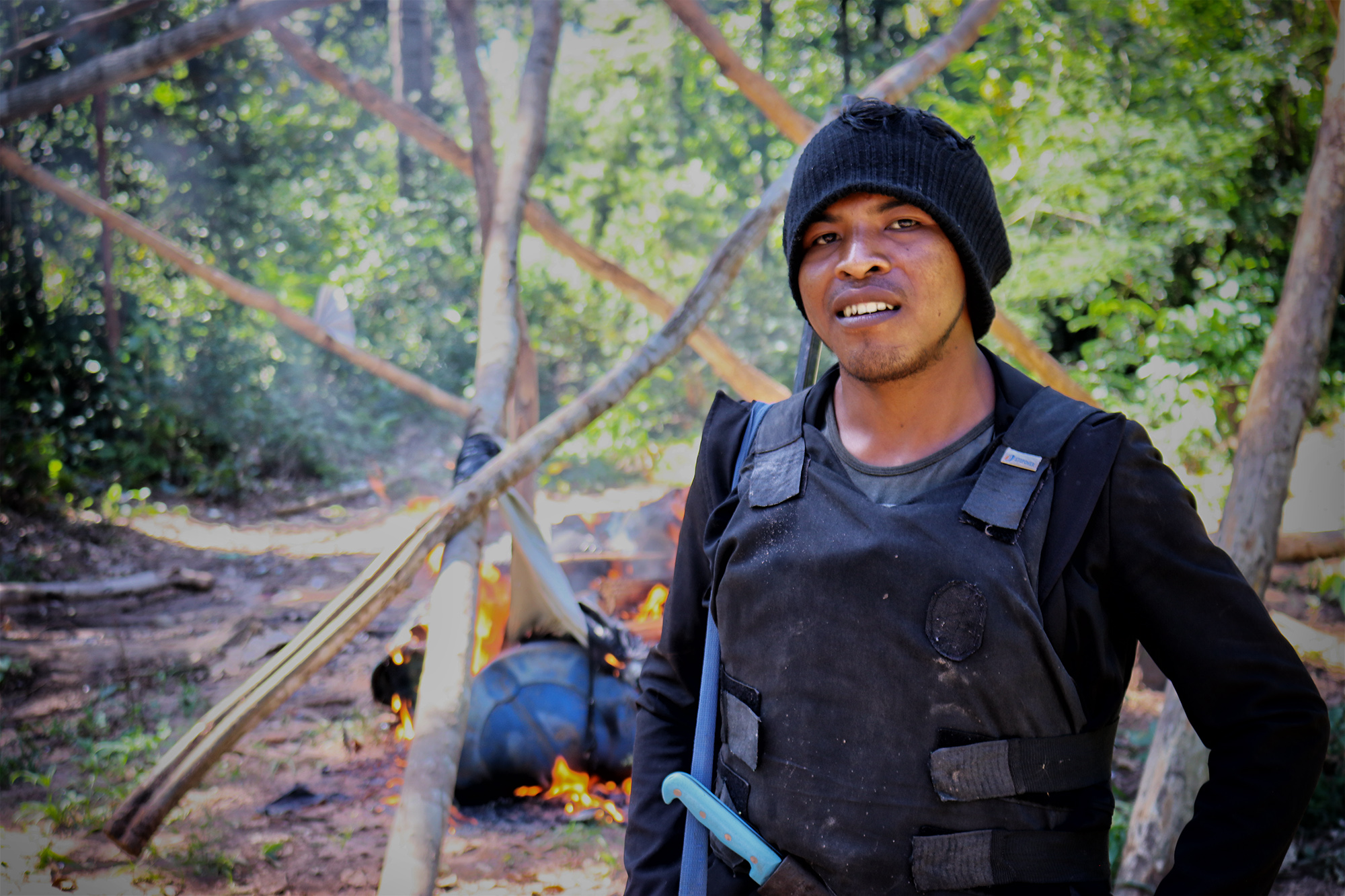- In memory of Paulo Paulino Guajajara († 26), the indigenous Guardian of the Forest that was killed on the 1st of November 2019.
- We want to remind the world of this man and talk about the conflicts that the Tenetehar (Guajajara) are facing in Brazil.
- We talked to Carlos Travassos, a friend of Paulo Paulino who worked many years at the FUNAI, the National Indian Foundation, and works closely with the Tenetehar until today and with Henaky Guajajara, Agroecologist and beekeeper who lives in Barreirinha indigenous village.
- Since Paulo’s death, four other indigenous were killed in a total of at least 47 in the last 20 years.
Author: Sina von der Heyde
Leia em Português. Auf Deutsch lesen.
::
Context — Who is Paulo Paulino Guajajara and what happened to him?
One year ago Paulo Paulino Guajajara, who is of indigenous descent, was murdered in an ambush by three illegal loggers when he and his friend, Tainaky Guajajara, were fetching for water in their territory Araribóia. Paulo Paulino died immediately after being shot but Tainaky Guajajara could luckily flee and become the living testimony of what happened to him and his dear friend. Both were part of the Guardians of the Forest, a group of indigenous people founded in 2012 as a reaction to the invasion of their lands through illegal loggers, miners and farmers and augmenting killings. Besides Paulo Paulino at least 47 assassinations of Tenetehar were registered in the last 20 years by the CIMI (Catholic Board For Indigenous), four of them after Paulo Paulinos assassination!
Paulo Paulino was a beloved friend, relative, partner and father. He was also one of the most committed fighters for the rights of the Guajajara and their neighbors, the Awá Guaja andthe Awá, a partly uncontacted community with whom they share the territory Araribóia. A tribute to Paulo Paulino published by the NGO Survival International reveals that he profoundly understood how important the amazonian ecosystems and their protection were to the survival of the Tenetehar.
::


::
The Tenetehar and their fight against colonial structures
Even though Tainaky Guajajara experienced the ambush himself the investigating police office distanced itself from the idea that the assassination resulted out of „ethnic conflicts or in an ambush of loggers directed at the indigenous”. This conclusion neglects Tainaky Guajajaras statement but most severely, it negates the fact that Paulo Paulinos murder as well all the other assassinations of the Tenetehar are routed in a century-long conflict beginning with the colonization of the territories through the Portuguese. And even though Brazils constitution of 1988 attributes the reserve Araribóia to the Tenetehar and the Awá, invaders never really stopped intruding the territory. The main reason for this, says Carlos Travassos, is the prevailing „institutional racism” and the fact that until today the rule of law followed „colonial thinking”, not only in in Maranhão but in Brazil in general. We live in a racist society full of prejudices, laments Travassos.
“In the case of Maranhão, specifically Araribóia (…) the absence of the Brazilian state has created a big loophole, an economic and political parallel” — C. Travassos
Today the state of Maranhão is one of the most dangerous places for indigenous people. Their social situation is facing „big challenges”, explains Travassos, as local politics are „provincial“ and people holding important political offices are collaborating while they all somehow profit from the illegal activities in the forests. This “wide network of collaboration”, as Travassos calls it, and the institutionalized racism are the apparent reason why the crimes against the indigenous people are not prosecuted criminally.
“The indigenous agencies, FUNAI e SESAI, play a very big role especially when it comes to their absence” — C. Travassos
Since his election in 2019 Jair Messias Bolsonaro initiated an anti-indigenous strategy by cutting the funds for the FUNAI and has been dismissing committed agents of the same agency as well as the Special Secretariat of Indigenous Health (SESAI). In the past these agencies have in some way contributed to the impunity through their inadequate activity but now their hands a clearly tied. Backed up by the local, political structures this makes it easier for loggers to invade the indigenous territories — a development that has clearly led to Paulo Paulino’s assassination and that is confirmed by the police statement regarding this incident.

::
Solutions bringing peace and justice
“How should the Tenetehar transmit their traditional knowledge, make a sustainable living in this coexistence with the national population, when there’s no support for that?” — C. Travassos
With this severe aggravation solutions are needed, now more than ever, for the Tenetehar and the other indigenous communities in Araribóia. The group of the Guardians of the Forest is one effective solution as it fills the political gap in their territory and calls the intruders to account for their crimes. Also, regarding the conflicts with the national majority of Brazil,says Carlos Travassos, „the economic cycle of exploration has to be weakened.” The internal discrepancies between the indigenous groups have to be solved as well which is exactly what the Guardians of the Forest aim at — „to create a oneness of thought in the territory that addresses itself to the past but also to the future generations,” explains Travassos.
“Working on various fronts in an organized and strategic way is essential ” — C. Travassos
As Travassos makes clear we have to tackle these problems on many levels. We need to act politically, dismantle colonial structures, educate people about the injustice the indigenous population-groups are facing, and we also need to understand, globally, that they are contributing tremendously to the wellbeing of our planet!
Meli also wants to help the Tenetehar which is why we are developing a partnership with the Guardians of the Forest to strengthen meliponiculture in strategic areas on their land. For this we plan on working with indigenous people, as for example Jonas Guajajara, who is committed to native bees in his community. He studied Agroecology in the Technical Institute of Maranhão (IFMA) and wrote his final thesis about native bees in his community. We want to potentialize the work the Tenetehar are already very committed to, bringing new possible livelihoods and strengthening their fight against illegal intruders.
“Taking care of native bees, we take care of the Forest. That is what motivated me to start the work on meliponiculture (native beekeeping) in the indigenous village of Barreirinha” – J. Guajajara
We send our condolences to the relatives of Paulo Paulino, Dorivan Soares Guajajara, Zezico Rodrigues Guajajara and all the other brave souls that died fighting for the justice of their friends and family. We all stand with you along the fronts of this fight and one happy day, we are sure, your territory will be safe and without pain again! No more profits for the few, no more suppression of your valuable culture and no more destroyed ecosystems — only peace and justice!
Title Image: Paulo Paulino Guajajara, Survival International
Great you’re checking our blog!
You can keep in touch with us via here
Or find us at Linkedin, Facebook, Twitter or Instagram
www.meli-bees.org
❤️


4 Replies to “The life-threatening challenges to indigenous forest guardians one year after Paulo P. Guajajara’s assassination”